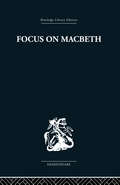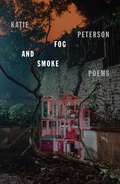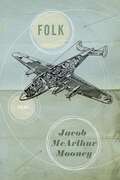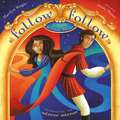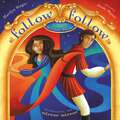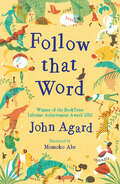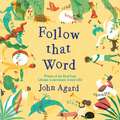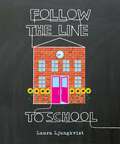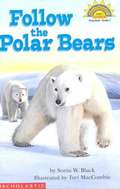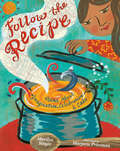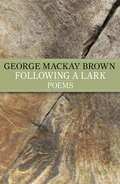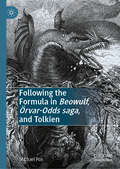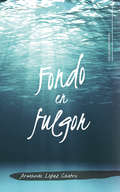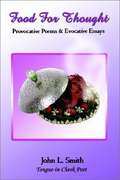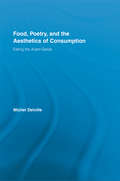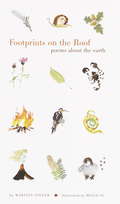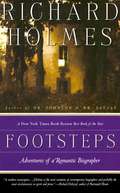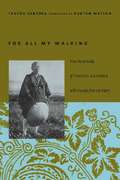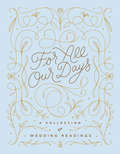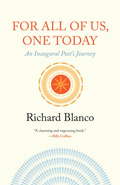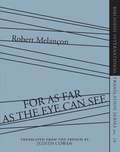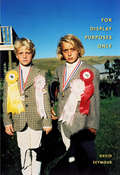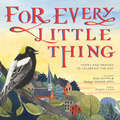- Table View
- List View
Focus on Macbeth
by John Russell BrownFirst published in 1982. Macbeth exercises a strange influence over readers and theatre audiences: the words of the text offer no easy clue to meaning or significance and in dramatic structure the play is very different from other Shakespearean tragedies. Many kinds of study are needed in order to understand the tragedy of Macbeth and this book provides a wide range of studies that respect the individuality of the text and examine it from different viewpoints. Contents include: Themes and Structure; Characterization and Narrative, Visual Effects, Performance in the Eighteenth, Nineteenth and Twentieth Centuries; Historical and Political Background; Role of Witchcraft; Game Theory. Contributors include: John Russell Brown, Derek Russell Davis, Gareth Lloyd Evans, R A Foakes, Michael Goldman, Robin Grove, Peter Hall, Michael Hawkins, Brian Morris, D J Palmer, Marvin Rosenberg and Peter Stallybrass.
Fog and Smoke: Poems
by Katie PetersonPeterson unfurls the quotidian fabric of our lives, patterned with the difficulties of language and this moment.Confusion frames the human predicament. In Katie Peterson’s Fog and Smoke, confusion is, literally, our climate. Writing to and from the California landscape, Peterson sees fog and smoke as literal—one a habitual, natural weather event, the other an increasingly common aftereffect of the West’s drought-caused fires. But they are also metaphysical. Fog and smoke reflect the true conditions (and frustrations) of our ability to perceive and to connect. Peterson writes, “I’ve been speaking about it at a distance. / Now I want to talk about its thickness. / A person could get killed in here.” The collection moves through three sections: First, the poet follows her local fog’s cyclical journey of descent and dispersion. Second, in a sort of pastoral interlude, she travels widely, almost erratically, to the California desert, the greater world, and ancient history. Finally, she descends into the enclosed space of the household, and the increased confinement and intimacy of raising a child during the pandemic. Peterson unfolds the small moments that make up our lives and reveals the truths contained within them, and her poems capture the lyricism of our daily rhythms—the interruptions, dialogues, and epiphanies.
Folk
by Jacob McArthur MooneyThe two sections in Jacob McArthur Mooney&’s virtuoso collection – one rural in orientation, one urban – open an intricate conversation. Taking as its inciting incident the 1998 crash of Swissair Flight 111 off the coast of Nova Scotia, before moving to the neighbourhoods around Toronto&’s Pearson International Airport, Folk is an elaborately composed inquiry into the human need for frames, edges, borders, and a passionate probe of contemporary challenges to identity, whether of individual, neighbourhood, city, or nation. Mooney examines the fraught desire to align where we live with who we are, and asks how we can be at home on the compromised earth. This is poetry that poses crucial questions and refuses easy answers, as it builds a shimmering verbal structure that ventures &“beyond ownership or thought.&” Mooney&’s distinctive voice is seriously unsettling, deeply appealing, and answerable to our difficult times.
Follow Follow: A Book of Reverso Poems
by Marilyn SingerRead these clever poems from top to bottom and they mean one thing. Then reverse the lines and read from bottom to top and they mean something else;it is almost like magic! A celebration of sight, sound, and story, this book is a marvel to read again and again.
Follow Follow: A Book of Reverso Poems
by Marilyn SingerNow one of Booklist's 30 Best Books of the Year!"Genius!" – Wired.com“Marilyn Singer's verse in Follow Follow practically dances down each page . . . the effect is miraculous and pithy.” – The Wall Street JournalOnce upon a time, Mirror Mirror, a brilliant book of fairy tale themed reversos–a poetic form in which the poem is presented forward and then backward–became a smashing success. Now a second book is here with more witty double takes on well-loved fairy tales such as Thumbelina and The Little Mermaid.Read these clever poems from top to bottom and they mean one thing. Then reverse the lines and read from bottom to top and they mean something else–it is almost like magic!A celebration of sight, sound, and story, this book is a marvel to read again and again.
Follow that Word
by John AgardThe father of performance poetry, John Agard, brings you a collection of riotously funny poems. Follow that Word is a celebration of imagination and demonstrates the true diversity of language.A dazzling collection of over sixty poems, Follow That Word delivers John Agard's musings on people and places from the modern and historical world, this wonderful collection that can be rediscovered over and over again. With gorgeous black-and-white illustrations from Momoko Abe, these poems truly come to life for all children, and this collection belongs on every bookshelf.'It's been around from Creation dawn,And it only takes two to catch on, Try it people, and you'll soon see,This is a dance that can set you free,It's called the dance of diversity.'Reviews for Half-caste, and Other Poems: 'Rollicking Caribbean-flavored rhythms combined with serious matters such as racism define poet extraordinaire, Agard.' - VoyaA performance poet, Agard uses his rhyme, repetition and refrains that make his work sing...Skilful use of humour to get his serious points across. - The Book Horn Inc
Follow that Word
by John AgardThe father of performance poetry, John Agard, brings you a collection of riotously funny poems. Follow that Word is a celebration of imagination and demonstrates the true diversity of language.A dazzling collection of over sixty poems, Follow That Word delivers John Agard's musings on people and places from the modern and historical world, this wonderful collection that can be rediscovered over and over again. With gorgeous black-and-white illustrations from Momoko Abe, these poems truly come to life for all children, and this collection belongs on every bookshelf.'It's been around from Creation dawn,And it only takes two to catch on, Try it people, and you'll soon see,This is a dance that can set you free,It's called the dance of diversity.'Reviews for Half-caste, and Other Poems: 'Rollicking Caribbean-flavored rhythms combined with serious matters such as racism define poet extraordinaire, Agard.' - VoyaA performance poet, Agard uses his rhyme, repetition and refrains that make his work sing...Skilful use of humour to get his serious points across. - The Book Horn Inc
Follow the Line to School
by Laura LjungkvistFollow the line from the science corner to the library, from recess to show-and-tell. This new Follow the Line book-illustrated in Laura Ljungkvist's signature line style-takes children on a colorful, comforting, and altogether fun romp through the school day. With its unique modern design and engaging interactive text, Follow the Line to School is sure to appeal to both new and returning students.
Follow the Polar Bears
by Sonia W. BlackFollow the polar bears from hibernation through cubs growing and moving on. Learning to read is one of the most important accomplishments of early childhood. Hello Reader! books are designed to help children become skilled readers who like to read. Beginning readers learn to read by remembering frequently used words like "the," "is," and "and"; by using phonics skills to decode new words; and by interpreting picture and text clues. These books provide both the stories children enjoy and the structure they need to read fluently and independently. A fun way to learn about polar bears with picture descriptions added.
Follow the Recipe: Poems About Imagination, Celebration, and Cake
by Marilyn SingerA joyful collection of poems by the author of Mirror Mirror, in the form of recipes both simple and allegorical.This delicious collection of poems by the innovative Marilyn Singer is accompanied by vibrant splashy artwork by two-time Caldecott honoree Marjorie Priceman. Presented in a small-size format to appeal to older readers (as well as young), the book has the look of a vintage collector's compendium that includes pictures, ephemera and annotations to add interest. Even young children are familiar with recipes--a series of steps to help them make something--and the book begins with simple dishes and ideas (such as a recipe for reading a recipe and a recipe for measuring), and then adds more ideas and grows in sophistication until the last recipes broach lofty concepts (such as a recipe for understanding and a recipe for peace). A treasure of words and images and ideas.
Following A Lark
by George Mackay Brown George Mackay-BrowA country boy creeps unwillingly to school on a lark-filled summer morning. Norse crusaders, preparing to sail on Earl Rognvald's crusade in 1151 break into the burial chamber at Maeshowe seeking treasure, and cut runes in its massive stones. And the famous Iceland poet Thorbjorn leaves his farm to join the group of poets whose lyrics stud like gems that famous pilgrimage. The ancient northern ceremonies of solstice and equinox, Easter and Yule, are brought to vivid life in the poems collected in this book, and so also are some of the holidays of the Christian calender. The cycle of seasons is more noticeable in the north, especially perhaps winter, the time of story-telling and music. There are tributes to the great poet of winter, Robert Burns, and a celebration of the Irish veteran of the Peninsular War who founded a tavern in Orkney in 1821. The life of an islander is 'sweetly compacted' in The Laird and the Three Women.
Following A Lark
by George Mackay BrownA country boy creeps unwillingly to school on a lark-filled summer morning. Norse crusaders, preparing to sail on Earl Rognvald's crusade in 1151 break into the burial chamber at Maeshowe seeking treasure, and cut runes in its massive stones. And the famous Iceland poet Thorbjorn leaves his farm to join the group of poets whose lyrics stud like gems that famous pilgrimage. The ancient northern ceremonies of solstice and equinox, Easter and Yule, are brought to vivid life in the poems collected in this book, and so also are some of the holidays of the Christian calender. The cycle of seasons is more noticeable in the north, especially perhaps winter, the time of story-telling and music. There are tributes to the great poet of winter, Robert Burns, and a celebration of the Irish veteran of the Peninsular War who founded a tavern in Orkney in 1821. The life of an islander is 'sweetly compacted' in The Laird and the Three Women.
Following the Formula in Beowulf, Örvar-Odds saga, and Tolkien
by Michael FoxFollowing the Formula in Beowulf, Örvar-Odds saga, and Tolkien proposes that Beowulf was composed according to a formula. Michael Fox imagines the process that generated the poem and provides a model for reading it, extending this model to investigate formula in a half-line, a fitt, a digression, and a story-pattern or folktale, including the Old-Norse Icelandic Örvar-Odds saga. Fox also explores how J. R. R. Tolkien used the same formula to write Sellic Spell and The Hobbit. This investigation uncovers relationships between oral and literate composition, between mechanistic composition and author, and between listening and reading audiences, arguing for a contemporary relevance for Beowulf in thinking about the creative process.
Fondo en fulgor
by Armando López CastroLa sombra se hace verbo. El fondo de lo abisal se despliega como la aparición súbita de la otra voz en el tejido de la escritura. Esta fulguración inmediata de lo oscuro corresponde por naturaleza a la palabra poética, que hace que algo esté presente por su ausencia. Debido a la oscuridad primordial que los rodea, los poemas de Fondo en fulgor (2019) viven en el límite entre lo dicho y lo no dicho, instalándose en la iluminación de lo más real, que es lo que impulsa el lenguaje y revela su sentido más oculto.
Food Trucks!
by Mark Todd"Talk about your meals on wheels!" A convoy of comic food trucks is heading your way, serving up a mouthful of good eats with a side of humor and verse. They've got everything from french fries to falafel. You can sample sushi. Build a burger. Eat an empanada! There's a food truck flavor to satisfy every appetite in this comically illustrated picture book with rhyming text. A fun and informative homage to tasty treats and transportation. Additional fun facts on food history and nutrition are also peppered throughout the book.
Food for Thought: Provocative Poems and Evocative Essays
by John L. Smith"Brunch Neither an early breakfast, nor a fashionable late lunch, But rather eaten on the ill-conceived, hopeful hunch, That eating the one single meal, will make you thinner, If to-night you skip your formal, sit-down Sunday dinner. But 1 predict that this will be far from true; For I been watching closely everyone of you. Scoffing bacon, egg, sausage, chicken and danish down. Enough to make the Duchess of York, groan and frown. The problem is, that in having paid table d'hote, A sense of gastronomic proportion is now totally remote, As you eat heartily to get your money's worth. You'll bloat your tummy and backside girth Try to lose the ugly weight you've gained, if you are able, By splitting your sides with laughter while sitting at the table. By applauding each act with an energetic, standing ovation, Much easier than a fortnight of painful, near-starvation True this poem is but one extended pun. And may even make you want to scream, cut and run; But nowadays where can you read, hear and imagine so much fun. So squeaky clean, and not the usual, very crude and very dumb."
Food, Poetry, and the Aesthetics of Consumption: Eating the Avant-Garde (Routledge Studies in Twentieth-Century Literature)
by Michel DelvilleFrom Plato’s dismissal of food as a distraction from thought to Kant’s relegation of the palate to the bottom of the hierarchy of the senses, the sense of taste has consistently been devalued by Western aesthetics. Kant is often invoked as evidence that philosophers consider taste as an inferior sense because it belongs to the realm of the private and subjective and does not seem to be required in the development of higher types of knowledge. From a gastrosophical perspective, however, what Kant perceives as a limitation becomes a new field of enquiry that investigates the dialectics of diet and discourse, self and matter, inside and outside. The essays in this book examine the importance of food as a pivotal element – both materially and conceptually – in the history of the Western avant-garde. From Gertrude Stein to Alain Robbe-Grillet and Samuel Beckett, from F.T. Marinetti to Andy Warhol, from Marcel Duchamp to Eleanor Antin, the examples chosen explore the conjunction of art and foodstuff in ways that interrogate contemporary notions of the body, language, and subjectivity.
Footprints on the Roof
by Marilyn SingerThis provocative collection of poems ranges from such lofty subjects as an astronaut's view of Earth to the burrows of worms and little creatures within the earth, "where I try to tread softly: a quiet giant leaving only footprints on the roof. " Marilyn Singer's lilting free verse offers visual images that give us fresh new insights and respect for the mighty power of volcanoes, fens, islands, deserts, dunes, and natural disasters. Singer's easily accessible poems also include some of the lighter moments of childhood, such as sliding on ice and playing in mud. Meilo So's distinctive india ink drawings on rice paper provide an especially handsome showcase for these buoyant nature poems. From the Hardcover edition.
Footsteps: Adventures of a Romantic Biographer
by Richard HolmesIn this gripping book, Holmes takes us from France's Massif Central, where he followed the route taken by Robert Louis Stevenson and a sweet-natured donkey, to Mary Wollstonecraft's Revolutionary Paris, to the Italian villages where Percy Shelly tried to cast off the structures of English morality and marriage.
For All My Walking: Free-Verse Haiku of Taneda Santoka (Modern Asian Literature Series)
by Santoka TanedaIn April 1926, the Japanese poet Taneda Santoka (1882–1940) set off on the first of many walking trips, journeys in which he tramped thousands of miles through the Japanese countryside. These journeys were part of his religious training as a Buddhist monk as well as literary inspiration for his memorable and often painfully moving poems. The works he wrote during this time comprise a record of his quest for spiritual enlightenment.Although Santoka was master of conventional-style haiku, which he wrote in his youth, the vast majority of his works, and those for which he is most admired, are in free-verse form. He also left a number of diaries in which he frequently recorded the circumstances that had led to the composition of a particular poem or group of poems. In For All My Walking, master translator Burton Watson makes Santoka's life story and literary journeys available to English-speaking readers and students of haiku and Zen Buddhism. He allows us to meet Santoka directly, not by withholding his own opinions but by leaving room for us to form our own. Watson's translations bring across not only the poetry but also the emotional force at the core of the poems. This volume includes 245 of Santoka's poems and of excerpts from his prose diary, along with a chronology of his life and a compelling introduction that provides historical and biographical context to Taneda Santoka's work.
For All Our Days: A Collection of Wedding Readings
by VariousFor All Our Days is a sweeping collection of 50 poems and musings to read at a wedding ceremony.Readings range from Shakespearean sonnets and historical love letters to excerpts from classic novels and children's books—and even stand-up comedy routines. Covering a wide range of speech themes and styles, this book ensures there is something for every couple.• A must-have for any couple planning their wedding• Organized into secular and spiritual sections, with religious texts from five major faiths• A sweet reminder of what marriage is all aboutEngaged couples will love exploring For All Our Days before the big day.This elegant collection of readings is also wonderful for wedding officiants and planners alike.You'll love this book if you love books like The Knot Guide to Wedding Vows and Traditions: Readings, Rituals, Music, Dances, and Toasts by Carley Roney; The Wedding Ceremony Planner: The Essential Guide to the Most Important Part of Your Wedding Day by Judith Johnson; and A Wedding Ceremony To Remember: Perfect Words For The Perfect Wedding by Marty Younkin.
For All of Us, One Today: An Inaugural Poet's Journey
by Richard BlancoFor All of Us, One Today is a fluid, poetic account of Richard Blanco's life-changing experiences as the inaugural poet in 2013. In this brief and evocative narrative, he shares the story of the call from the White House committee and all the exhilaration and upheaval of the days that followed. For the first time, he reveals the inspiration and challenges--including his experiences as a Latino immigrant and gay man--behind the creation of the inaugural poem, "One Today," as well as two other poems commissioned for the occasion ("Mother Country" and "What We Know of Country"), published here for the first time ever, alongside translations of all three of those poems into his native Spanish. Finally, Blanco reflects on his new role as a public voice, his vision for poetry's place in our nation's consciousness, his spiritual embrace of Americans everywhere, and his renewed understanding of what it means to be an American as a result of the inauguration. Like the inaugural poem itself, For All of Us, One Today speaks to what makes this country and its people great, marking a historic moment of hope and promise in our evolving American landscape.From the Trade Paperback edition.
For As Far as the Eye Can See
by Robert MelançonIn the 144 poems of For as Far as the Eye Can See, Robert Melançon re-imagines the sonnet as a "rectangle of twelve lines," and poetry as "a monument as fragile as the grass." Impressionistic, seasonal, allusive, in language sharp and clean, this form-driven collection is both a book of hours and a measured meditation on art, nature, and the vagaries of perception.Robert Melançon is one of Québec's most revered contemporary poets and a two-time winner of the Governor General's Award. A longtime translator of Canadian poet A.M. Klein, Melançon has been the poetry columnist for Le Devoir and the Radio-Canada program En Toutes Lettres; he is also a critic and has been a professor at the University of Montreal. In addition to the Governor General's Award he is a past recipient of the Prix Victor-Barbeau and the Prix Alain-Grandbois.
For Display Purposes Only
by David SeymourIThese poems pause for the spectacle: cloning technologies, super-slo-mo photography, narcotic cab rides. Making fun of consciousness, they describe a system of tripwires, pitfalls and decoys that this notion of daily viewership entails. These poems are paeans to our facility for duplicity and self-deception, where the act of living becomes more and more like watching a ?lm in which we play no role.
For Every Little Thing: Poems and Prayers to Celebrate the Day
by Helen CannA Junior Library Guild SelectionHow do you find joy in ordinary moments? How do you mark small wonders like the return of the fireflies or a friend&’s helping hand? Arranged from waking up to falling asleep, For Every Little Thing is an engaging collection of the day and its delights. This inspirational anthology gathers classic selections, modern prayers, and new poems from multiple cultures and faiths. From Emily Dickinson to Amma, from Ken Nesbitt to Rabbi Rami M. Shapiro, fifty-one voices encourage children to be present and thankful at all hours. Accessible language and richly detailed illustrations celebrate simple pleasures like slurping noodles and splashing in puddles. Perfect for sharing around the table or at bedtime, For Every Little Thing will awaken a sense of gratitude in readers of all ages.
